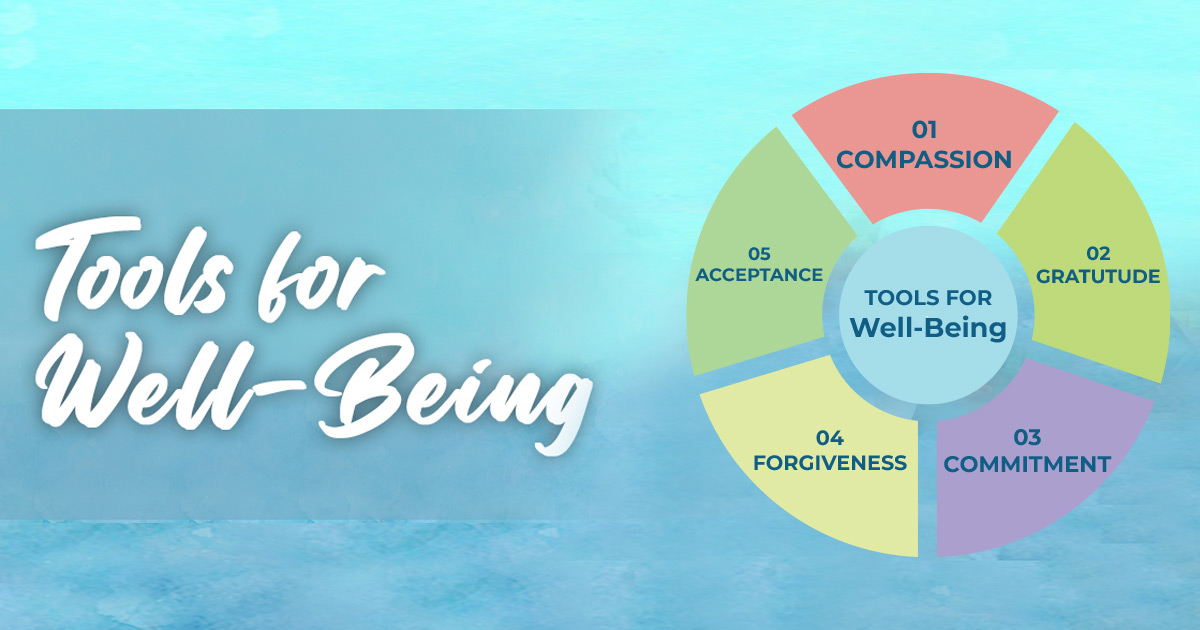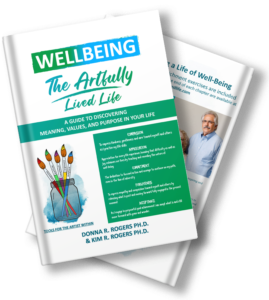The 5 Essential Tools for Well-being
Have you ever watched a framer or roofer that has mastered the use of tools such as a hammer. After setting a nail one blow from his hammer drives it all the way in. I have used a hammer on occasion, and this is definitely not my experience. Like construction tools, we also have tools for thought and behavior. Like physical tools, we can use these tools in various situations with increasing skill and mastery. We just need to practice.
Although there are many of these psychological tools, five of them when used alone and especially together can significantly improve our sense of well-being.
Forgiveness toward yourself and others for mistakes that are made as you are moving forward fully engaged in the present moment,
Gratitude for all things, including the gifts of difficulties and experiences, as we strive to learn and grow,
Acceptance of life events as we experience them, including imperfections and mistakes as you engage in activities and pursue goals that give your life meaning and purpose,
Self-compassion, kindness, compassion, and care toward yourself as you refine your many abilities, as well as for others in your world, and
Commitment to intention, focused action, and courage, even in the face of adversity.
What does the research say?
You are likely to be familiar with these ideas as virtues in a religious context or as teachings in a current or ancient wisdom context, and rightfully so. Behaviors that work are often passed from generation to generation. I find it interesting, however, that clinical studies over the past decade have shown that using each of these tools/skills/behaviors can have dramatic and positive effects in one’s life. For example, the use of forgiveness can,
Reduce stress and anxiety leading to improved physical and mental health.
Lower blood pressure and heart rate which reduce the risk of heart disease.
Improve sleep. Forgiveness has been linked to improved sleep quality which is essential for overall health and well-being.
Reduce Pain which is linked to better quality of life.
Increase self-esteem. Forgiveness has been shown to lower anxiety and depression and result in greater self-esteem indirectly through reducing anger and increasing hope for the future.
Another tool for psychological well-being is gratitude. Practicing gratitude in various ways (lists, daily affirmations, etc.) can also improve our sense of well-being. This is where it gets interesting, research indicates that when gratitude is practiced with forgiveness, people report a decrease in their anger and feelings of loneliness. This is because those who practice a greater degree gratitude and forgiveness more consistently and together tend to let go of negative emotions and cultivate a sense of acceptance and compassion toward themselves and others.
Next, growth and maintenance of self-compassion is established by treating oneself with kindness, understanding, and acceptance of who we are.
Acceptance allows us to acknowledge and accept our thoughts, emotions, and experiences with less judgement. This leads to a greater sense of peace and well-being.
Research has, in fact, suggested significant links among forgiveness, gratitude, acceptance and self-compassion.
Commitment to using and mastering each of these tools in response to our lived experience provides an additive effect, where the benefits of each practice amplify and reinforce each other. Using these practices regularly provides us with a greater sense of well-being. The synergistic effect of gratitude, forgiveness, self-compassion, acceptance, and commitment is a powerful tool for improving mental and emotional well-being.
How can this work for me?
Perhaps you have seen these ideas or similar ones in other articles and blog posts and thought to yourself, sure, these are good ideas, But, how am I supposed to do all that stuff when my life feels so chaotic, unpredictable and overwhelming. The thing is, you don’t have to do everything all the time. Awareness of our thinking and emotions is the key and realization that we have a choice in our behavior is the door that we unlock. Practicing these tools will lead us toward a better sense of well-being.
It is also important to remember that on occasion, just as we may smack our thumb with a hammer, we are likely to react poorly rather than respond wisely to challenging situations and that is absolutely OK because we are practicing forgiveness – of ourselves, gratitude – for mistakes and the opportunity to grow, self-compassion, acceptance and commitment in our everyday lives.
Where can I get additional information on stress management and well-being?
“WellBeing: The Artfully Lived Life,” is a complete guide to psychological well-being; a holistic concept, encompassing all aspects of our lives. This book offers a wealth of insights and practical advice for practicing mindfulness, fostering meaningful relationships and engaging in thinking and behavior that brings joy and fulfilment in your life. Taking small steps each day can lead to transformative changes in your well-being, ultimately leading to a more balanced and artful existence.


